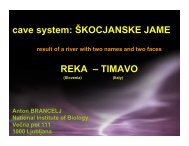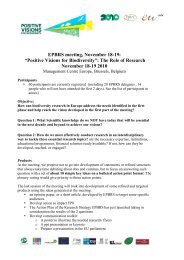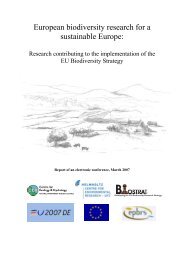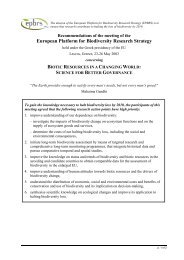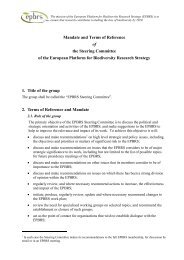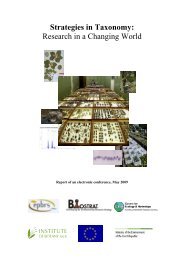Evaluation of the effectiveness of the New Instruments of ... - CORDIS
Evaluation of the effectiveness of the New Instruments of ... - CORDIS
Evaluation of the effectiveness of the New Instruments of ... - CORDIS
You also want an ePaper? Increase the reach of your titles
YUMPU automatically turns print PDFs into web optimized ePapers that Google loves.
3.4. Ensuring participation <strong>of</strong> all players<br />
Truly innovative research and scientific risk is not achieved<br />
The ambition to increase <strong>the</strong> impact through substantial funding <strong>of</strong> fewer projects creates two<br />
types <strong>of</strong> biases: towards research groups which have already proven <strong>the</strong>ir excellence and<br />
towards “well-accepted’ objective-driven research. <strong>New</strong> approaches, higher scientific risk and<br />
emerging research groups tend to be excluded.<br />
The participation <strong>of</strong> SMEs is problematic<br />
The involvement <strong>of</strong> SMEs in Framework Programmes is essential if Europe is to raise R&D<br />
investment to reach <strong>the</strong> objective <strong>of</strong> 3% <strong>of</strong> GDP. SMEs are <strong>of</strong> strategic importance in many<br />
areas <strong>of</strong> <strong>the</strong> Programme including innovation, exploitation <strong>of</strong> results and <strong>the</strong> FP6 objective <strong>of</strong><br />
raising competitiveness.<br />
With a target <strong>of</strong> 15% participation across <strong>the</strong> seven Priority Thematic Areas, <strong>the</strong> current level<br />
<strong>of</strong> participation <strong>of</strong> 13% is seen to be both realistic and encouraging as FP6 continues.<br />
However, <strong>the</strong>re is clear evidence that SMEs are having some difficulties with <strong>the</strong> <strong>New</strong><br />
<strong>Instruments</strong>, especially NoEs. Meanwhile SMEs are continuing to participate enthusiastically<br />
in <strong>the</strong> Specific Research Activities for SMEs (Collective Research and CRAFT).<br />
One positive aspect <strong>of</strong> SME participation in <strong>the</strong> <strong>New</strong> <strong>Instruments</strong> is <strong>the</strong> appearance <strong>of</strong><br />
research-intensive SMEs as well as industrial SMEs to carry out specific tasks in IPs. SMEs<br />
can play a critical, specialised role in many areas such as research, demonstration, training,<br />
technology transfer and dissemination. These critical roles can be played by various types <strong>of</strong><br />
SMEs (from start-up to mature companies, from providers <strong>of</strong> specialised services to<br />
traditional industrial companies, from management-owned to <strong>of</strong>f-shoots <strong>of</strong> large companies).<br />
The Panel has observed that <strong>the</strong> information available on SME participation does not allow<br />
differentiation between types and roles.<br />
Particularly noteworthy is <strong>the</strong> emergence <strong>of</strong> SME-led IPs in Thematic Priority 3<br />
(nanotechnologies and nanosciences) and SME-led STREPS in Thematic Priority 4 (food<br />
safety and quality) and <strong>the</strong>se initiatives are to be encouraged across o<strong>the</strong>r <strong>the</strong>matic areas.<br />
Problems encountered by SMEs in <strong>the</strong> <strong>New</strong> <strong>Instruments</strong> relate especially to <strong>the</strong> processes <strong>of</strong><br />
consortium building, evaluation and contract negotiation. Guidance is missing at <strong>the</strong> level <strong>of</strong><br />
SMEs <strong>the</strong>mselves, but is also missing for scientific <strong>of</strong>ficers and contract negotiators in order<br />
to ensure that SMEs, like o<strong>the</strong>r weaker players, are protected from exploitation by stronger<br />
consortium partners.<br />
In general, SMEs require lower levels <strong>of</strong> bureaucracy, short-term projects, short time-tomarket<br />
topics and flexibility to join and to leave long-term projects. Durable integration<br />
makes SME participation in Networks <strong>of</strong> Excellence an almost impossible requirement. It is<br />
also very difficult for SMEs to be involved in <strong>the</strong> co-ordination <strong>of</strong> very large IPs.<br />
The participation <strong>of</strong> groups from <strong>New</strong> Member States is problematic<br />
Participation from <strong>New</strong> Member States (7%) is growing too slowly, which can partly be<br />
explained by <strong>the</strong> introduction <strong>of</strong> <strong>the</strong> <strong>New</strong> <strong>Instruments</strong>.<br />
The barriers to be a co-ordinator <strong>of</strong> a project submitted under <strong>the</strong> <strong>New</strong> <strong>Instruments</strong> are high:<br />
• <strong>the</strong> cost <strong>of</strong> <strong>the</strong> preparation process with <strong>the</strong> needs to travel and to have precontractual<br />
meetings<br />
15



